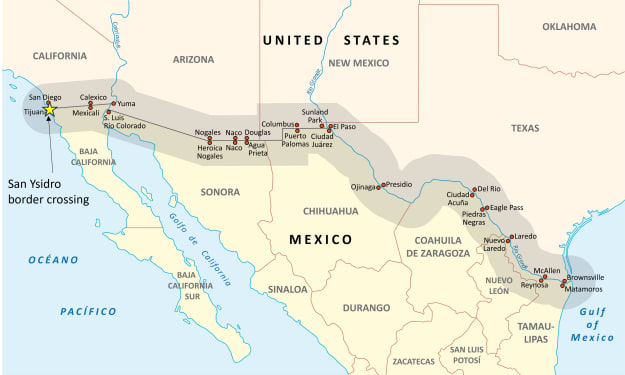Ancient Underwater Marvels: Sharks Outlasted Trees by 50 Million Years
A Deep Dive into the Evolutionary History of Sharks and Their Journey Through Time as Earth's Remarkable Predators

This post was created with the support of OpenAI.
Prepare for an enlightening voyage through time as we explore a lesser-known fact about our natural world: sharks have been around longer than trees. While it might be difficult to imagine, the first sharks appeared more than 400 million years ago, while the first trees made their appearance about 350 million years ago. In this comprehensive blog, we'll delve into the depths of history to learn about the evolutionary journey of these ancient marine creatures and their incredible tale of endurance and adaptation. Join us on this captivating exploration of the world of sharks.
Sharks - Tracing the Lineage of Today's Apex Predators
Early Beginnings: Ancient Ancestors of Modern Sharks
The first sharks swam through our oceans over 400 million years ago, during the Silurian Period. These ancient sharks differed greatly from their modern counterparts, bearing a closer resemblance to fish. They had a cartilaginous skeleton, similar to modern sharks, but lacked the distinctive teeth and streamlined body shape we associate with them today.
Evolution and Diversification
Over millions of years, sharks have evolved into the powerful predators we are familiar with today. This remarkable evolutionary journey has resulted in more than 500 species of sharks, each with unique characteristics and adaptations. Some of the most well-known species include the great white shark, tiger shark, and hammerhead shark. Sharks have adapted to a variety of environments, from deep ocean trenches to shallow coastal waters and even freshwater habitats.
Trees - A Younger Addition to Earth's Biodiversity
The Emergence of Trees
Trees, on the other hand, are relative newcomers to the planet. The first trees emerged around 350 million years ago during the Devonian Period, significantly later than sharks. These early trees were primitive, lacking leaves and seeds. They were more like large plants with a simple branching structure and reproduced through spores.
Evolution of Modern Trees
It was only after millions of years of evolution that trees developed into the diverse and complex organisms we see today, which play a crucial role in maintaining the Earth's ecosystems. The emergence of trees brought about significant changes to the planet, including the formation of vast forests that helped to increase oxygen levels in the atmosphere, paving the way for the evolution of more complex life forms.
The Role of Sharks in Marine Ecosystems
Sharks as Indicators of Healthy Ecosystems
Sharks are apex predators, meaning they sit at the top of the food chain. Their presence in an ecosystem is an indicator of its health, as they help maintain the delicate balance of marine life. Sharks regulate the populations of their prey, which in turn affects the populations of organisms lower down the food chain. This balance is crucial for maintaining biodiversity and the overall health of marine ecosystems.
Sharks and Ecotourism
In addition to their ecological importance, sharks also play a role in ecotourism. Shark-watching and cage-diving experiences are popular tourist attractions in many parts of the world, providing an economic incentive for shark conservation. By fostering a sense of awe and respect for these ancient predators, ecotourism can help raise awareness about the importance of sharks in our oceans.
Threats to Sharks and the Importance of Conservation
Human-Induced Threats
Despite their impressive evolutionary history, sharks face numerous threats today. Overfishing, habitat destruction, and climate change are all contributing to the decline of shark populations worldwide. Overfishing, including targeted fishing for shark fins, has led to a significant decrease in many shark species. The loss of coastal habitats due to human activities and pollution also puts pressure on shark populations.
Climate Change and Its Impact on Sharks
Climate change is another significant threat to sharks. Rising ocean temperatures and ocean acidification can affect the distribution of prey species and disrupt the delicate balance of marine ecosystems. Additionally, the loss of coral reefs, which serve as vital nurseries and feeding grounds for many shark species, further jeopardizes their survival.
The Importance of Shark Conservation
To preserve these ancient creatures and the vital role they play in our oceans, it is crucial that we implement effective conservation strategies and promote awareness about the importance of sharks in maintaining the balance of marine ecosystems. Efforts to protect sharks include establishing marine protected areas, regulating fishing practices, and implementing international agreements to curb illegal fishing and trade in shark products.
What We Can Learn from Sharks
Lessons from Evolutionary Success
Sharks have endured for over 400 million years, making them one of the most successful species on Earth. Their evolutionary adaptability can teach us valuable lessons about resilience, adaptation, and survival. By studying sharks and their ancient history, we can gain a better understanding of the factors that have contributed to their long-lasting success and how they have shaped marine ecosystems throughout Earth's history.
The Interconnectedness of Life on Earth
The story of sharks also serves as a reminder of the intricate web of connections that exist between all living organisms on our planet. As apex predators, sharks play a pivotal role in maintaining the balance of life in our oceans. Their survival is inextricably linked to the health of marine ecosystems and, ultimately, to the well-being of our planet as a whole.
Conclusion
The incredible story of sharks' ancient origins and their enduring presence on Earth offers a captivating glimpse into the complexity of our natural world. Understanding the evolutionary journey of sharks and their role in maintaining the health of our oceans is essential for developing effective conservation strategies. As we continue to explore the depths of our planet's history, let us remember the importance of preserving and protecting these remarkable survivors for generations to come. Together, we can ensure that these ancient marvels continue to thrive and inspire awe for millennia to come.
Thank you for taking the time to read our article!
If you enjoyed the content, please consider leaving a '<3' and Subscribe so you don't miss future releases!
If you wish to support us on our mission to provide free, weekly infotainment for you to enjoy, please consider pledging a small donation or leaving a tip - all donations help us to create our work and support us as creators.
If you wish to begin your Vocal journey, join the Vocal+ programme to get more for your work! Earn more per view, withdraw your profits quicker, access Vocal+ Challenges with prizes to be won weekly, and so much more by clicking here!
Let's start a conversation! Leave a comment on what you'd like us to discuss in future articles, or reach out on our Social Media Channels!
You're the reason we can continue doing what we love. We are forever grateful for your support!
About the Creator
People! Just say Something!
Quirky Writing created by Artistic Creativity and the power of AI with the goal of learning something new every day!
Facebook: https://www.facebook.com/PeopleJSS
Twitter: https://twitter.com/PeopleJSS






Comments
There are no comments for this story
Be the first to respond and start the conversation.